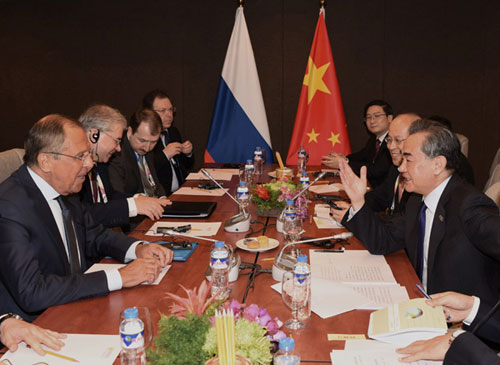
On August 6, 2017 local time, Foreign Minister Wang Yi met in Manila of the Philippines with Foreign Minister Sergey Lavrov of Russia on the sideline of the series of Foreign Ministers' meetings on East Asia Cooperation.
Wang Yi said that China and Russia enjoy good relations. President Xi Jinping's state visit to Russia last month has achieved complete success and historical outcomes, which not only deepens bilateral strategic cooperation, but also sends a concerted voice on promoting international peace and stability. Both sides made a commitment that no matter how the international situation changes, the two countries will continuously and staunchly regard each other as the priority of respective diplomacy, deepen strategic mutual trust, reinforce mutual support and intensify comprehensive coordination. China stands ready to intensify coordination with Russia to well prepare the other meetings between the two heads of state within this year and enhance cooperation within the BRICS framework.
Sergey Lavrov agreed with the positive appraisal on bilateral relations made by Wang Yi, and expressed that the heads of Russia and China enjoy close and sound relations. In July, the meeting between the two heads of state has achieved a significant success. At present the Russian side is actively implementing the consensus reached by the two heads of state. President Vladimir Putin expects to visit China at the beginning of September for the BRICS Summit in Xiamen, and the Russian side will fully support the BRICS Summit in Xiamen to achieve a complete success.
Exchanging in-depth views on the current Korean Peninsula situation especially on the recent adopted UN Security Council resolution concerning the Democratic People's Republic of Korea, both sides believed that Russia and China share highly consistent stances on the Korean Peninsula issue, and agreed to continuously keep close communication and coordination on the issue. At present, the top priority is to prevent the tense Peninsula situation from escalating, and propel the Peninsula nuclear issue to get back to the right track of settlement through dialogue as soon as possible on the basis of the "suspension-for-suspension" proposal and "dual track" approach.
